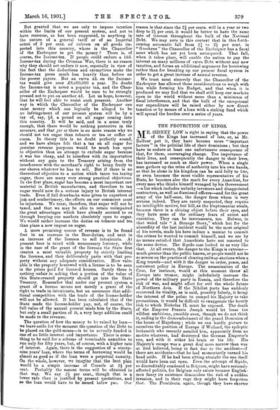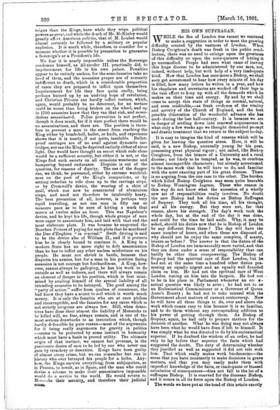THE PROTECTION OF KINGS.
MR. SIDNEY LOW is right in saying that the power of the Kings has increased of late, or, as Mr. Balfour put it, they have become more "important factors" in the political life of their dominions ; but they have to endure at least one unfortunate consequence of that, for them, encouraging change. The importance of their lives, and consequently the danger to their lives, has increased as much as their power. When a single man gathers up the reins of authority into his own hands, so that he alone in his kingdom can be said fully to live, or even becomes the moat visible representative of his State, he becomes also the mark for every Anarchist, for every man who thinks himself wronged by his Government —a list which includes unlucky inventors and disappointed contractors, as well as dismissed officers—.and for the great army of the half-sane, the danger from whom is very serious indeed. They are rarely suspected, they require no intelligible motive, but kill, as the kleptomaniac steals, because there is a shining object before their eyes, and they have none of the ordinary fears of arrest and execution. They can be instruments, too. Bulwer, in that weird tale "A Strange Story," which but for the absurdity of the last incident would be the most original of his novels, made his hero induce a maniac to commit the crimes he wanted to commit himself, and we are by no means satisfied that Anarchists have not resorted to the same device. The Sipido case looked to us very like that. At all events, the danger to the Kings is extreme— much greater than the public knows, or people would not be so severe on the practice of clearing railway-stations when a King travels—and with it the danger to order, peace, and consistent policy in Europe. The assassination of the Czar, for instance, would at this moment throw all Europe into tremor, might indefinitely increase the power of the military party in Russia, and therefore the risk of war, and might affect for evil the whole future of Northern Asia. If the Nihilist party has suddenly recovered its vitality, as is said, possibly falsely, it being the interest of the police to compel his Majesty to take precautions, it would be difficult to exaggerate the hourly risk to which Nicholas IL must be exposed. The death of the Emperor Francis Joseph would let loose the wildest ambitions, possibly even, though we do not think it, ending in the dismemberment of the grand Dominion of the house of Hapsburg ; while we can hardly picture to ourselves the position of Europe if Weiland, the epileptic locksmith who recently assailed him, apparently from no motive whatever, had destroyed the German Emperor's eye, and with it either his brain or his life. His Majesty's escape was a great deal more narrow than was at first believed, being in fact due to the accident—if there are accidents—that he had momentarily turned his head aside. If he had been sitting straight the eye itself would have been cut open. Even the attempt of Sipido, so discreditably condoned in Belgium, might have seriously affected politics, for Belgium only exists because English- men fancy its existence diminishes the risk of a sudden invasion, and in their rage they might have forgotten ,that. The Presidents, again, though they have shorter
reigns than the Kings, have while they reign political powers as great,and while the death of Mr. McKinley would greatly aff•-ct American politics, that of M. Loubet would almost certainly be followed by a military or popular explosion. It is worth while, therefore, to consider for a moment whether it is possible by precaution to guarantee a Sovereign's or a President's life.
We fear it is nearly impossible unless the Sovereign condemns himself, as Al■-xander III. practically did, to imprisonment for life in his own palace. Penalties appear to be entirely useless, for the semi-lunatics take no heed of them, and the assassins proper are of necessity indifferent to death, which in a considerable proportion of cases they are prepared to inflict upon themselves. Imprisonment for life they face quite coolly, being perhaps buoyed up by an undying hope of revolution, and Christian Princes can hardly inflict torture, which, again, would probably be no deterrent, for no torture 2ould be worse than being broken on the wheel, and up to 1700 assassins knew that they ran that risk, and never- theless assassinated. Police prevention is not perfect, though it does much, for if it were perfect there would be no assassinations, and there are. The problem is there- fore to prevent a man in the street from reaching the King either by bombshell, bullet, or knife, and experience shows that it is nearly, if not quite, insoluble. Bullet- proof carriages are of no avail against dynamite car- tridges, nor can the King be deprived entirely either of airor light. One would have thought an escort which rode close would be a. sufficient security, but either it is not, or the Kings find such escorts on all occasions wearisome and hampering beyond endurance. Disguise is out of the question, for reasons of dignity. The use of the dagger can, we think, be prevented, either by extreme watchful- ness on the part of the King's companions, or by setting orderlies to ride close up to the carriage steps, or by Cromwell's device, the wearing of a shirt of mail, which can now be constructed of aluminium rings, and need not therefore be intolerably heavy. The best precaution of all, however, is perhaps very rapid travelling, as not one man in fifty can so measure pace as to be sure of hitting a mark that moves at twelve miles an hour. This was Napoleon's device, and he kept his life, though whole groups of men were eager to assassinate him, and laid with that end the most elaborate plots. It was because he suspected the Bourbon Princes of paying for such plots that he murdered the Due d'Enghien "in reprisal." Swift driving is said to be the device also of William II., and if it protects him he is clearly bound to continue it. A King in a modern State has no more right to defy assassination than he has to inflict any other useless misfortune on his people. Be must not shrink in battle, because that dispirits his armies, but for a man in his position facing assassins is not courage but foolhardiness. A King, how- ever, cannot always be galloping, he has his work to do outside as well as indoors, and there will always remain an element of danger in his position, which is best mini- mised by availing himself of the special liability of all intending assassins to be betrayed. The good among the " party of action" suffer from qualms of conscience, the
bad know they have a secret to sell which is worth much money. It is only the fanatics who are at once pitiless and incorruptible, and the fanatics for any cause which is not strictly religious are always few. Still, when detec- tives have done their utmost the liability of Monarchs to be killed will, we fear, always remain, and is one of the most serious drawbacks to an institution which, though hardly defensible by pure reason—most of the arguments for it being really arguments for gravity in politics —seems to be protected by some instinct in humanity which must have a basis in proved utility. The ultimate origin of that instinct, we cannot but presume, is the passionate desire of men to be led by one who never can gain by treachery or desertion. Kings have been guilty of almost every crime, but we can remember but one in history who ever betrayed his people for a bribe. Any- how, the Kings survive everything, from subjugation, as in Prussia, to revolt, as in Spain, and the man who could devise a scheme to make their assassination impossible would do a service to the world. He would return to Mona' chili their serenity, and therefore their judicial sense.







































 Previous page
Previous page